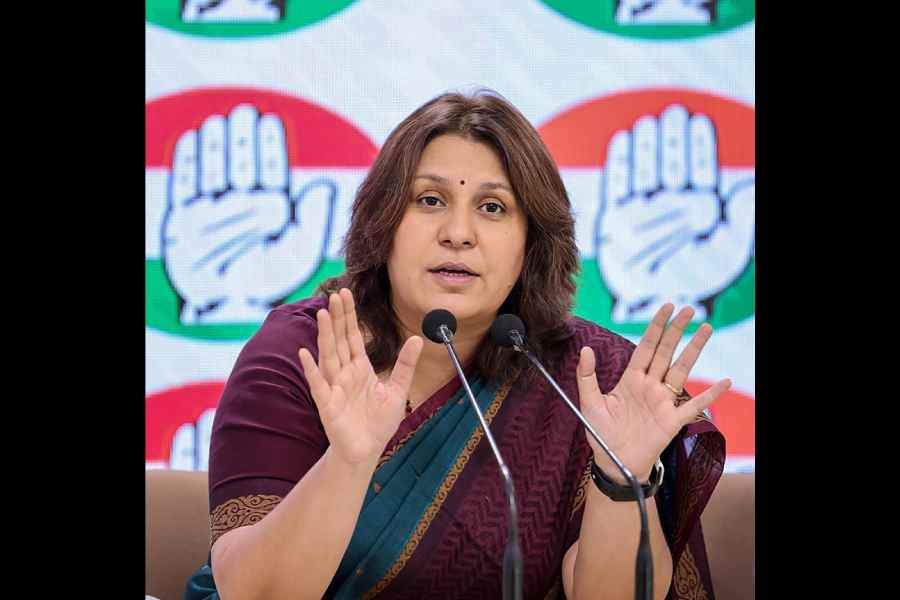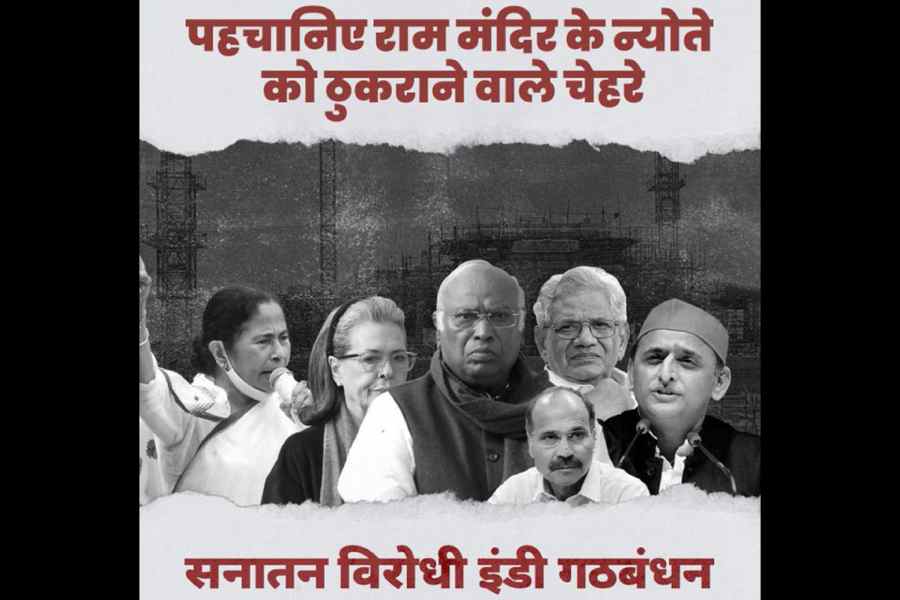The Congress is trying to confront the BJP’s “anti-Hindu” slur over its refusal to attend the January 22 Ayodhya ceremony by citing the Shankaracharyas’ decision to skip the event for being held against what they consider scripture-mandated norms.
“The sycophants who are breathlessly screaming since last evening against the Congress should debate why all the four Shankaracharyas are not going,” Congress
social media head and spokesperson Supriya Shrinate said.
She asked: “Why was the Nirmohi Akhara, which performed the rituals for Ram Lalla for decades, sidelined?”
Many Congress leaders wondered whether passing the “loyalty test” set up by the RSS-BJP had now become an essential qualification for being considered a Hindu.
They asked whether the Sangh Parivar would now use its political power to brand
as “anti-Hindu” the Shankaracharyas, who will stay away from the January 22 consecration because it will be held in an incompletely built temple.
The BJP and some media outlets have targeted the Congress leadership, accusing it of an anti-Hindu and pro-Muslim mindset. They have displayed photographs of Congress leaders attending iftar events.
The BJP has also flagged a letter that India’s first Prime Minister, Jawaharlal Nehru, wrote rejecting an invitation to the inaugural ceremony of the refurbished Somnath temple in Gujarat.
Nehru had adopted an ethical stance, underlining the need for the State to keep its distance from religion. But India has undergone a sea change since then, and current Prime Minister Narendra Modi is unabashedly projected as the sole guarantor of Hindu interests.
Modi had acted as head priest of the State, laying the foundation stone for the Ram temple in Ayodhya and performing the required religious rituals. He is going to be the main host at the January 22 ceremony, too.

Congress spokesperson Supriya Shrinate. PTI file picture
Some of the Hindu religious heads, including the Shankaracharyas, who have decided to stay away from the consecration have objected to the ceremony being advanced for electoral gain. Some others have asked whether they have been invited to just clap at an event where Modi would perform the religious rituals.
“The Shankaracharyas have played a pivotal role in the development of ancient Sanatana traditions and the spread of the Hindu religion,” Shrinate said.
She stressed how the “four mutts across the country” headed by the Shankaracharyas were “serving the Hindu religion”.
“Swami Avimukteshwaranandji of Joshimath, Swami Nishchalanand of Gowardhanmath of Puri, Swami Bharti Krishnateerth of the Shringeri Sharda Peeth of Karnataka and Swami Sadanandji of Dwarkapeeth – all Shankaracharyas — are angry because of the BJP’s propaganda. They are not going to Ayodhya,” she said.
Some Hindu religious heads have also accused the VHP of trying to divide Hindus in the context of the Ram temple.
Champat Rai, VHP leader and general secretary of the temple trust that sent out the invitations to the January 22 ceremony, had countered the Shankaracharyas’ criticism of the event’s timing by saying the temple belonged to the Ramanand sect and not the sanyasis or the Shaiva sect.
Shankaracharya Nischalanand Saraswati of Puri has responded to this, saying: “If the temple belongs to the Ramanand sect, what are Champat Rai and others doing there? Let them hand it over to the Ramanand sect.”
Amid the question whether the Sangh Parivar had ended up dividing Hindu saints, the darling of the BJP, Dhirendra Shastri of Bageshwar Dham, has refused to criticise the Shankaracharyas’ stand.
It is, however, more convenient for the BJP to target the Congress than the Shankaracharyas, who are widely revered in the country.
BJP spokesperson Sudhanshu Trivedi on Thursday claimed that the difference between Mahatma Gandhi’s Congress and Nehru’s Congress was visible now.
He sought to argue that the Congress had abandoned Gandhi and his quest for “Ram Rajya”.
The Mahatma’s perception of religion, however, was entirely different from the Sangh Parivar’s.
Gandhi believed in the plurality of religions and abhorred any concept of the superiority of some races or religions.
Stressing the need for equal respect for all religions, Gandhi had said: “While I believe myself to be a Hindu, I know that I do not worship God in the same manner as any one or all of them.”
He had insisted that the desecration of any temple, mosque or church amounted to a denial of God’s existence.










